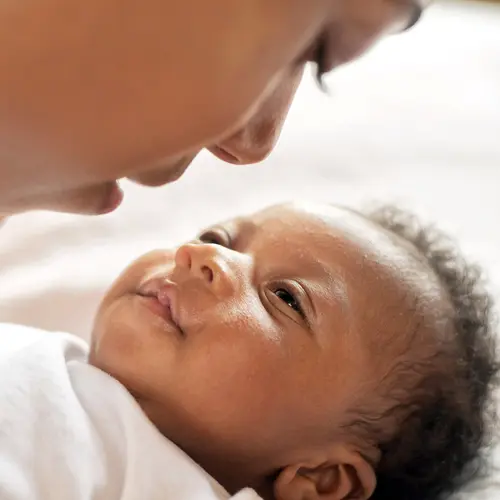Your newborn is home now, and you're settling into a daily routine. Keeping your baby warm and nourished is tops on your list. Baby skin care is just as important.
Newborn skin is delicate -- and so is the baby's immune system. While there are several normal newborn rashes, chemicals, fragrances, and dyes in clothing, detergents, and baby products can cause newborn skin irritation, dryness, chafing, and rashes. However, there's much you can do to protect your baby from these skin problems.
The upside to baby's skin sensitivity? Your touch on your newborn's skin has a soothing, nurturing effect -- and is critical to your baby's development.
Natural Baby Skin Care
A newborn baby is born with wrinkly skin and a protective covering called vernix that naturally peels off during the first week. There's no need to rush it, rub it, or treat it with lotions or creams. (If baby is born past the due date, this process is likely finished while they are still inside the womb.)
With newborn skin care, the adage is "less is more." Here are tips to help protect your baby from developing allergies and rashes:
Resist the urge to bathe your baby frequently. Too-frequent bathing -- more than three times per week during the first year of life -- removes the natural oils that protect baby's skin. That may leave baby's skin vulnerable and dry. It may also aggravate eczema.
Except for drool and diaper changes, newborns don't get very dirty. Babies aren’t working 9 to 5 and hitting the gym afterward! For the first month or so, a sponge bath two or three times a week will keep your baby safely clean. In between, simply clean baby’s mouth and diaper area with a little water or cleanser.
Once-a-week sponge baths (or even less) are best for newborns with the cord still attached.
Don't use Scented baby products in the early months. This can irritate your baby's delicate skin.
Wash baby's clothing before it's worn. Use only baby laundry detergents that are fragrance- and dye-free. Wash baby clothes, bedding, and blankets separately from the family's laundry. Or use the same detergent for the entire family.
Newborn Dry Skin: Eczema
Most newborn skin problems, such as eczema or diaper rash, don't develop for the first month or two. Eczema appears as a red, itchy rash mostly on face and scalp, at the elbows, and behind the knees.
A few tips on preventing dry, irritated skin and eczema:
- Minimize the use of soap and keep bathtime short.
- Limit your use of baby scented skin products. If their skin is dry, use only ointment or lotion on dry skin areas.
- Make sure baby wears only soft clothing, preferably cotton.
Check with your pediatrician about using over-the-counter lotions or creams to treat eczema. You may need a prescription treatment.
Baby Skin Care: Diaper Rash
Most often, diaper rash is caused by the irritating wetness of a soiled diaper. The rash can also develop when baby's skin is not properly dried after a bath. Sometimes, a bacteria or yeast infection will cause diaper rash. Babies taking antibiotics are especially susceptible to a yeast infection diaper rash because the drugs allow fungal growth.
Most forms of diaper rash don't require medical care. To treat diaper rash -- and prevent further newborn skin problems:
- Check diapers frequently.
- Change diapers immediately when wet or soiled.
- Wash the diaper area with mild fragrance-free cleanser or plain water. If the rash is severe, use a squirt bottle to cleanse without rubbing.
- Use a soft clean cloth, not baby wipes. The perfume or alcohol in some wipes can further irritate and dry baby's skin.
- Pat baby dry. Don't rub. Let the diaper area air-dry fully before putting on a fresh diaper.
- Apply a thick layer of petroleum jelly (such as Vaseline) or a protective ointment such as Desitin, A&D or Triple Paste.
- Avoid using using baby powder.
See your pediatrician if the rash doesn't clear up in two to three days. If the rash is caused by eczema, a bacterial or yeast infection, or other condition, you may need a prescription treatment.
Newborn Skin Soaks Up Calming Touch
Giving your newborn a massage is important one-on-one time. Like cuddling, a massage is a way to convey your love and affection for your baby. In fact, research shows that a baby's very survival depends on being touched by others -- as touch triggers hormones, boosts immunity, and helps fight disease. Also, massaged babies are calmer, sleep better, and cry less -- every parent's dream!
There's no special technique to massaging a baby. Find a carpeted floor in a warm room. Simply lay baby on a soft blanket or fabric. Get a little baby oil or a gentle lotion. Warm it in your hand. Then gently massage baby's chest and tummy -- using a gentle yet firm touch. Try to make eye contact and talk to your baby. Sing softly.
If there's any fussing, baby may not be ready for a massage. Or the massage may be too forceful, so use a gentler touch. It's the time spent together that's most important.


